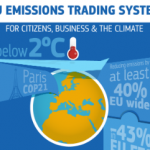Millions of people die prematurely of indoor pollution and other consequences of energy poverty. Centralized power systems have failed them, writes Jatin Nathwani of the University of Waterloo. But there is a way to empower the powerless: with microgrids and decentralized technologies. Courtesy The Conversation. … [Read more...]
Rapid wind and solar cost declines keep pushing fossil fuels out. How far can they go?
Rapid cost declines made renewable energy the United States’ cheapest available source of new electricity, without subsidies, in 2017, writes Silvio Marcacci of think tank Energy Innovation. In many parts of the U.S., building new wind is cheaper than running existing coal, while nuclear and natural gas aren’t far behind, notes Marcacci. As renewable energy costs continue their relentless decline, they keep pushing fossil fuels further from … [Read more...]
Spain’s energy regulator rejects government plan to prop up coal
Spain’s energy regulator has rejected an attempt by the government to prop up the nation’s oldest and most polluting coal power plants, stating that Spain’s massive overcapacity means it can safely close a “significant part of the existing coal fleet” without undermining security of supply, write Gerard Wynn of IEEFA (Institute for Energy Economics and Financial Analysis), Paolo Coghe of Paris-based indepdent consultancy Acousmatics, and Carlota … [Read more...]
Emissions reductions from carbon pricing can be big, quick and cheap
The UK carbon tax on fuel for power generation provides the most clear-cut example anywhere in the world of large scale emissions reductions from carbon pricing, writes climate change economist Adam Whitmore. These reductions have been achieved by a price that, while higher than in the EU ETS, remains moderate or low against a range of other markers, including other carbon taxes. … [Read more...]
Are renewable energy cost reductions coming to an end? What next?
Renewable energy’s steep cost reductions may be tapering off, as investments levels are flat and system costs are becoming more important than component costs, writes independent energy expert Roger Arnold. According to Arnold,this implies that policy support should shift to storage and infrastructural approaches. … [Read more...]
Will China’s Belt and Road Initiative help or hinder clean energy?
China’s Belt and Road Initiative, the broad infrastructure and market-building initiative of the world’s second-largest economy, has a different feel than trade agreements initiated in the West – and it could have major implications for the future of energy across many parts of the world, writes Sonia Aggarwal, Vice President of think tank Energy Innovation, and Director of America’s Power Plan. … [Read more...]
China just launched the world’s largest carbon market. Here are 3 ways it can succeed
On December 19, China formally launched its national carbon market. By setting a carbon price on the country’s largest greenhouse-gas emitters, China has launched a new, crucial endeavor in its efforts to tackle pollution and climate change, write Hal Harvey and Hu Min of the San Francisco-based think tank Energy Innovation. … [Read more...]
Winds of change: Britain now generates twice as much electricity from wind as coal
Just six years ago, more than 40% of Britain’s electricity was generated by burning coal. Today, that figure is just 7%. Yet if the story of 2016 was the dramatic demise of coal and its replacement by natural gas, then 2017 was most definitely about the growth of wind power, write Grant Wilson and Iain Staffell. Courtesy The Conversation. … [Read more...]
Why we shouldn’t be so quick to trust energy modelling
In Australia a fierce debate is raging over the future of the national electricity market. The arguments from the government and its critics are all based on energy models, but the outcome of models strongly depends on their underlying assumptions, writes Hugh Saddler of Australian National University. These are difficult to verify, since all models that are used are proprietary and cannot be independently evaluated. One way to move past the … [Read more...]
A fresh start for climate change mitigation in New Zealand
The election of the sixth Labour-led government, in a coalition with the Greens, heralds a new direction for climate change policy in New Zealand, writes professor Robert McLachlan of Massey University. That is high time, according to McLachlan: the country’s emission trading system has not delivered, greenhouse gas emissions have risen. Courtesy The Conversation. … [Read more...]
The case for additional actions within the EU ETS has just become stronger
It is sometimes thought that total emissions in the EU ETS (Emission Trading System) are equal to the cap, and so any additional actions, such as phase-out of coal power, increasing energy efficiency and deploying more renewables, have no effect. But this is not true, writes climate change economist Adam Whitmore. Indeed, according to Whitmore, recently agreed reforms to the EU ETS strengthen the case for additional actions. For policymakers, … [Read more...]
Ukraine: energy transition could work wonders, but policies are “the least ambitious in the world”
Ukraine can reduce its energy dependence and build a strong economy on clean and safe renewable energy, a new study shows. Unfortunately, the latest Energy Strategy adopted by the government in August shows a complete lack of ambition to pursue a low-carbon transition. Ukraine’s “nationally determined contribution” under the Paris Agreement is the least ambitious in the world, according to an independent analysis. … [Read more...]
After Bonn, 5 things to watch for in the coming year of global climate policy
Five things that should have happened at the recent climate conference in Bonn, didn’t happen, write Marc Hudson and Matthew Paterson of the University of Manchester. But there is life beyond the UNFCCC process. They identify five things to watch for in climate policy in the coming year – if it isn’t too late already to save the world from climate change. Courtesy The Conversation. … [Read more...]
Renewables in Africa are losing ground: a proposal for a practical climate finance instrument
If the One Planet Summit in Paris on 12 December is to meet its expectations, it must lead to a new cost- and carbon-efficient instrument to support decentralised renewable electricity generation across Africa, writes Terje Osmundsen, Courtesy Energi og Klima blog. … [Read more...]
Trump’s tax bill: big win for oil and gas, profound threat to renewables and environment
The Republican Party (GOP) tax proposal, if it is adopted unchanged, would slash tax credits for solar and wind power, slap a big tax on projects of “multinational” renewable developers, while leaving tax credits for oil and gas unchanged or even lowering them. It would also open up the Arctic National Wildlife Refuge for oil and gas exploration. Courtesy Oilprice.com. … [Read more...]
- « Previous Page
- 1
- …
- 3
- 4
- 5
- 6
- 7
- …
- 26
- Next Page »
















